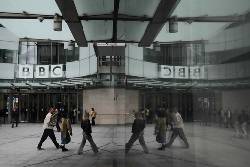LONDON (AP) — The BBC's chairman acknowledged Monday that it was too slow in responding over a misleading edit of a speech by U.S. President Donald Trump but rejected claims that the broadcaster's impartiality was being undermined from within its own board.
Senior BBC leaders were quizzed by Parliament’s Culture, Media and Sport Committee amid a major crisis at the publicly funded corporation after its director general and head of news both quit earlier this month and Trump threatened to file a billion-dollar lawsuit.
The BBC drew Trump's ire — and deep public scrutiny — after an internal memo compiled by one of its former external advisers was leaked to the British media. The memo criticized cases of alleged biased reporting over a documentary on Trump that was aired days before the 2024 U.S. presidential election, as well as other BBC coverage including its stance on transgender issues, Gaza and race.
Chairman Samir Shah said the broadcaster should have acted much quicker in addressing the allegations.
The third-party production company that made the documentary — titled “Trump: A Second Chance?” — spliced together three quotes from a speech Trump gave on Jan. 6, 2021, into what appeared to be one quote in which Trump urged supporters to march with him and “fight like hell.”
The editing made it look like Trump was directly encouraging his supporters to storm the U.S. Capitol as Congress was poised to certify President-elect Joe Biden’s victory in the 2020 election. Shah has acknowledged that the documentary gave “the impression of a direct call for violent action.”
“I think there's an issue about how quickly we respond ... why do we take so much time?" he told lawmakers Monday. “We should have pursued it to the end and got to the bottom of it, and not wait, as we did, till it became public discourse.”
The BBC said last week that Shah sent a letter to the White House saying that he and the corporation were sorry for the edit of the speech. But the broadcaster said it had not defamed Trump and rejected the basis for his lawsuit threat.
Political interference allegations
On Monday, Shah also defended board member Robbie Gibb, a nonexecutive director of the BBC's board who has been the subject of wide scrutiny because he was the director of communications for former Prime Minister Theresa May’s Conservative government.
Critics have accused Gibb of pro-Conservative Party bias and political interference at the BBC.
“I think I’ve become weaponized in terms of how I’m perceived,” Gibb said.
He rejected claims that a coup from within the BBC board forced the resignations of senior news leaders as “complete nonsense.”
Last week Shumeet Banerji, a BBC board member, also said he was stepping down over “governance issues,” sparking further questions about the corporation’s leadership.
Asked whether his own position was in doubt, Shah said his priority was to “steer the ship” and find a new director general.
Critic calls out ‘blind spots’ on failings
Earlier, lawmakers at the parliamentary session focused on questions about editorial standards raised by Michael Prescott, a former journalist and external editorial standards adviser to the BBC.
Prescott was the author of an internal note to BBC bosses that raised concerns about the editing of the Trump speech as well as other instances perceived as showing a left-leaning bias at the broadcaster. Among other things, it alleged that the broadcaster’s reporters promoted a pro-trans agenda and warned about an anti-Israel bias in the BBC’s Arabic service.
The Daily Telegraph newspaper published that note in early November, sparking the latest crisis.
In October, Britain’s media regulator sanctioned the BBC for a “materially misleading” documentary on the lives of children in Gaza because it failed to disclose that the father of the teen narrator held a position in the Hamas administration. The regulator said the program potentially eroded trust in the broadcaster.
Prescott said he believed the BBC had “systemic” issues with tackling problems raised and described the corporation as defensive and dismissive of concerns raised about its reporting.
He said ex-BBC director general Tim Davie and other managers “had this blind spot on editorial failings." But he told the lawmakers he didn't think there was “institutional bias” at the broadcaster.
The 103-year-old BBC faces much greater scrutiny than other broadcasters and commercial rivals because of its status as a national institution funded through an annual license fee of 174.50 pounds ($230) paid by all households who watch live TV or any BBC content. The broadcaster is bound by the terms of its charter to be impartial.
Legal experts have stated that Trump would likely face challenges in taking a case against the BBC's documentary to court in the U.K. or the U.S. They argue that the BBC could demonstrate that Trump wasn’t harmed, as he was ultimately elected president in 2024.
...


 Copyright © 1996 - 2025 CoreComm Internet Services, Inc. All Rights Reserved. | View our
Copyright © 1996 - 2025 CoreComm Internet Services, Inc. All Rights Reserved. | View our